 2 citations,
August 2022 in “Clinical Case Reports”
2 citations,
August 2022 in “Clinical Case Reports” A 17-year-old girl had severe, on-and-off hair loss, likely due to COVID-19. She was treated with Vitamin D3, biotin, and other supplements, and saw some improvement within a month.
 July 2021 in “Al-Azhar Assiut Medical Journal”
July 2021 in “Al-Azhar Assiut Medical Journal” Low ferritin, vitamin D deficiency, and thyroid problems may contribute to hair loss in some hospital patients in Western Saudi Arabia.
 February 1994 in “PubMed”
February 1994 in “PubMed” Telogen effluvium is a type of temporary hair loss.
 8 citations,
February 2017 in “Archives of Dermatological Research”
8 citations,
February 2017 in “Archives of Dermatological Research” Intense pulsed light treatment effectively reduces underarm hair by making hair follicles smaller and extending their resting phase.
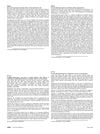 March 2014 in “Journal of The American Academy of Dermatology”
March 2014 in “Journal of The American Academy of Dermatology” Mycophenolic acid may help hair grow by activating pathways important for hair growth.
 January 2014 in “Journal of Pigmentary Disorders”
January 2014 in “Journal of Pigmentary Disorders” Women's hair gets thinner and grayer as they age, with treatments available for hair loss and graying.
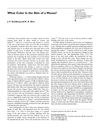 21 citations,
November 2011 in “Veterinary Pathology”
21 citations,
November 2011 in “Veterinary Pathology” Mouse skin color ranges from pink to black, depending on their hair growth cycle.

The system can automatically identify different hair and scalp conditions using machine learning.
 November 2023 in “Italian journal of dermatology and venereology”
November 2023 in “Italian journal of dermatology and venereology” Telogen effluvium is a common, often temporary hair loss caused by stress and other factors, and it's hard to pinpoint and treat.
January 2021 in “Hair therapy & transplantation” Telogen effluvium causes temporary hair loss, but new hair still grows.

Modern skin cancer treatments can cause skin side effects and hair loss, affecting patients' quality of life.
64 citations,
March 2004 in “The journal of investigative dermatology/Journal of investigative dermatology” GPRC5D is linked to the formation of hair, nails, and certain tongue areas.
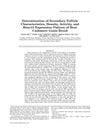 7 citations,
June 2015 in “The anatomical record”
7 citations,
June 2015 in “The anatomical record” Hexi cashmere goats' hair growth varies by stage, with Hoxc13 linked to hair activity.
 9 citations,
January 2017 in “International Journal of Trichology”
9 citations,
January 2017 in “International Journal of Trichology” The study suggests that mast cells might be involved in the hair loss condition telogen effluvium and could be a target for treatment.
 June 2020 in “Journal of clinical and investigative dermatology”
June 2020 in “Journal of clinical and investigative dermatology” Nourkrin® Woman with Marilex® improves hair growth, appearance, and confidence in women with hair loss.
 May 2023 in “Frontiers in Endocrinology”
May 2023 in “Frontiers in Endocrinology” Thyroid disease can cause skin, hair, and nail problems, and treating the thyroid condition often improves these symptoms.
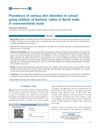 6 citations,
January 2013 in “Indian Journal of Paediatric Dermatology”
6 citations,
January 2013 in “Indian Journal of Paediatric Dermatology” About 69% of school children in Kashmir valley have skin disorders, with eczema and acne being the most common.
3 citations,
September 2015 in “Plastic and reconstructive surgery/PSEF CD journals” Pulsed Electric Fields can effectively stimulate hair growth in rats.
 January 2014 in “Springer eBooks”
January 2014 in “Springer eBooks” Chronic telogen effluvium is a condition where there is prolonged shedding of hair.
 September 2010 in “Companion Animal”
September 2010 in “Companion Animal” The guide explains how to diagnose and treat hair loss in dogs, covering causes and treatments, with some conditions lacking treatment options.
 30 citations,
March 2010 in “European Journal of Dermatology”
30 citations,
March 2010 in “European Journal of Dermatology” Hair loss in elderly women is often caused by various factors, including hormonal changes after menopause.
 June 2024 in “Archives of dermatological research”
June 2024 in “Archives of dermatological research” Targeted testing for telogen effluvium patients can save healthcare costs.

Erythropoietin overexpression disrupts hair growth and fat formation in mice.
 51 citations,
January 2004 in “Skin Pharmacology and Physiology”
51 citations,
January 2004 in “Skin Pharmacology and Physiology” The document explains hair growth and shedding, factors affecting it, and methods to evaluate hair loss, emphasizing the importance of skin biopsy for diagnosis.
 3 citations,
January 2019 in “Skin Research and Technology”
3 citations,
January 2019 in “Skin Research and Technology” Frequent use of hair straighteners can cause hair loss similar to scarring alopecia in young Turkish women.
 124 citations,
August 1990 in “British Journal of Dermatology”
124 citations,
August 1990 in “British Journal of Dermatology” Diffuse alopecia in women may be related to androgens and iron deficiency, and basic hormone and nutrient screening is useful.
 1 citations,
January 2013 in “Elsevier eBooks”
1 citations,
January 2013 in “Elsevier eBooks” The document reviews various hair and nail disorders, their causes, and treatments, emphasizing the need for proper diagnosis and the link between nail changes and systemic diseases.
 81 citations,
July 2011 in “Lasers in Medical Science”
81 citations,
July 2011 in “Lasers in Medical Science” The Lexington LaserComb helped regrow hair in mice with a condition similar to human hair loss.
 2 citations,
January 2014 in “Hair therapy & transplantation”
2 citations,
January 2014 in “Hair therapy & transplantation” New treatments for hair growth disorders are needed due to limited current options and complex hair follicle biology.
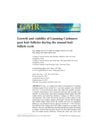 10 citations,
January 2014 in “Genetics and Molecular Research”
10 citations,
January 2014 in “Genetics and Molecular Research” Liaoning Cashmere goat hair follicles show synchronized growth patterns with lowest activity in May.


























